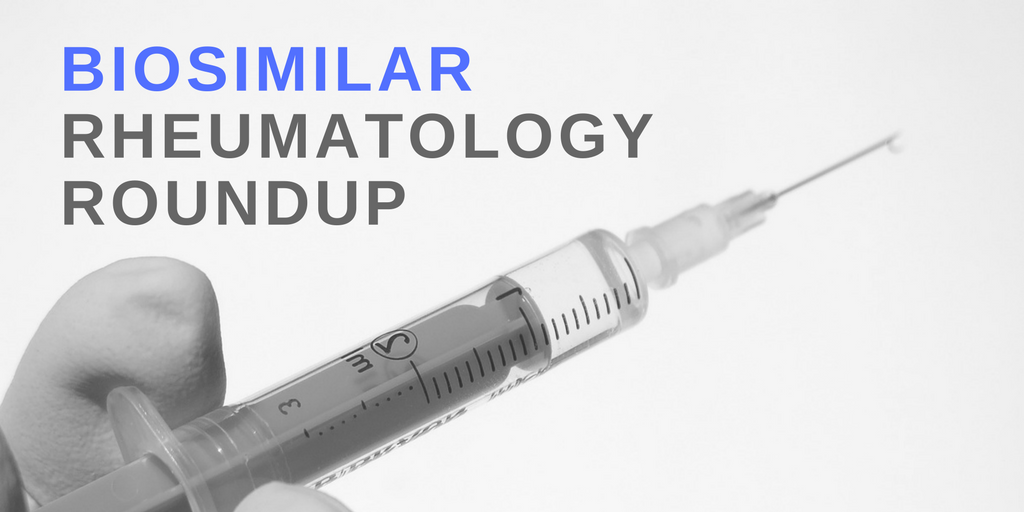- Bone Health
- Immunology
- Hematology
- Respiratory
- Dermatology
- Diabetes
- Gastroenterology
- Neurology
- Oncology
- Ophthalmology
- Rare Disease
- Rheumatology
Biosimilars Rheumatology Roundup: January 2025
January started the year off strong, with several business updates, long-term clinical trial results on multiple biosimilars, and the FDA approval of the third tocilizumab biosimilar.
January started the year off strong, with several business updates, long-term clinical trial results on multiple biosimilars, and the FDA approval of the third tocilizumab biosimilar.

January started the year off strong, with several business updates, long-term clinical trial results on multiple biosimilars, and the FDA approval of the third tocilizumab biosimilar.
Regulatory and Business Updates
Although it happened at the end of the month, the FDA gave the green light for Celltrion USA’s tocilizumab biosimilar, Avtozma (CT-P47, tocilizumab-anoh).1 The biosimilar was approved in intravenous and subcutaneous formulations for the treatment of rheumatoid arthritis (RA), giant cell arteritis, polyarticular juvenile idiopathic arthritis (JIA), systemic JIA, and COVID-19. The approval followed those for Biogen/Bio-Thera’s Tofidence and Fresenius Kabi’s Tyenne.
Additionally, 2 biosimilar companies made significant business and regulatory moves in Europe and Canada.2 Formycon and Fresenius Kabi gained approvals for their ustekinumab biosimilar, Otulfi, in the UK and Canada, expanding access to treatments for Crohn disease, ulcerative colitis, plaque psoriasis, and psoriatic arthritis.
Celltrion completed its European rollout of Steqeyma, another ustekinumab biosimilar, with launches in major markets like France, Germany, Spain, the UK, and Italy. The company said it plans further European expansion and a US launch while engaging in government and hospital tenders to capture market share.
An article looking back at all the FDA biosimilar approvals in 2024 noted several important biosimilars that were approved for rheumatic conditions.3 Tyenne (tocilizumab-aazg), a biosimilar to Actemra, was approved for conditions like RA and JIA. Additionally, 6 biosimilars referencing Stelara (ustekinumab), for treating autoimmune and rheumatic diseases, were approved. Of these approvals, Pyzchiva and Wezlana received interchangeability designations, allowing pharmacy-level substitution.
Clinical Trial Results
A study conducted in the UK and Ireland on patients with psoriasis treated with Samsung Bioepis' adalimumab biosimilar, SB5, showed good long-term tolerance and low treatment discontinuation rates, demonstrating its safety and effectiveness.4 The study involved 1195 patients over an average of 25.2 months, with 73.5% remaining on treatment after 1 year and 56.7% after 4 years. Discontinuations were mainly due to inefficacy (13.3%) and adverse events (12.6%). Results were comparable to those for reference adalimumab, although the study's limitations include the lack of a control group and limited generalizability.
ABP 654 (Wezlana), a biosimilar to ustekinumab (Stelara), has been shown to be functionally similar to the European Union and US reference products in in vitro studies.5 The study demonstrated comparable inhibition of interleukin (IL)-12 and IL-23 pathways, supporting its use across all indications of the reference product. Ongoing clinical trials are further validating its efficacy and safety for conditions like psoriasis and Crohn disease.
Cost-Effectiveness and Market Analyses
Insights regarding biosimilars in the rheumatology sector come from Samsung Bioepis’ First Quarter (Q1) 2025 Biosimilar Market Report.6 The report highlights that the adalimumab biosimilar market grew to 23% market share by the end of 2024, with Hyrimoz and Hadlima leading the market, offering substantial price reductions compared with Humira. Additionally, the infliximab biosimilar market reached 48% market share by Q3 2024, with a 7% decrease in average sales price by Q1 2025. Despite biosimilar growth, the originator products have maintained strong positions due to competitive pricing strategies.
A study in Farmacia Hospitalaria found that a biosimilar tocilizumab improved outcomes for patients with RA in Spain while being more cost-effective than other treatments.7 Biosimilar tocilizumab had the lowest cost per patient (€183,741) and demonstrated favorable results in quality-adjusted life-years (QALYs) and remission rates. It was the most cost-effective option compared with alternatives like certolizumab (€201,972). The findings showed that increasing biosimilar adoption could enhance resource allocation and expand patient care in Spain.
Lastly, a Dannish study assessing the impact of a nationwide mandatory switch from originator adalimumab to biosimilar adalimumab (GP2017 or SB5) found no increase in total health care costs over 9 months.8 In fact, hospital costs decreased for biosimilar switchers. The study, based on data from 1316 patients with RA, psoriatic arthritis, or axial spondyloarthritis, showed that although hospital costs remained stable or decreased, primary sector costs and non–pain medication costs rose for some patients.
References
1. Jeremias S. FDA approves Celltrion's Avtozma as third tocilizumab biosimilar. The Center for Biosimilars®. January 31, 2025. Accessed January 31, 2025. https://www.centerforbiosimilars.com/view/fda-approves-celltrion-s-avtozma-as-third-tocilizumab-biosimilar
2. Jeremias S. Eye on Pharma: Teva, Formycon, Celltrion biosimilar updates in global markets. The Center for Biosimilars. January 26, 2025. Accessed January 31, 2025. https://www.centerforbiosimilars.com/view/eye-on-pharma-teva-formycon-celltrion-biosimilar-updates-in-global-markets
3. Jeremias S. A banner year for biosimilars: the 19 FDA approvals from 2024. The Center for Biosimilars. January 21, 2025. Accessed January 31, 2025. https://www.centerforbiosimilars.com/view/eye-on-pharma-teva-formycon-celltrion-biosimilar-updates-in-global-markets
4. Jeremias S. Real-World UK, Ireland Study Confirms Long-Term Efficacy of SB5 in Psoriasis. The Center for Biosimilars. January 30, 2025. Accessed January 31, 2025. https://www.centerforbiosimilars.com/view/real-world-uk-ireland-study-confirms-long-term-efficacy-of-sb5-in-psoriasis
5. Jeremias S. Functional similarity between ustekinumab biosimilar SBP 654, Stelara in Crohn disease. The Center for Biosimilars. January 18, 2025. Accessed January 31, 2025. https://www.centerforbiosimilars.com/view/functional-similarity-between-ustekinumab-biosimilar-abp-654-stelara-in-crohn-disease
6. Jeremias S. Biosimilars Drive Cost Savings and Achieve 53% Market Share Across Treatment Areas. The Center for Biosimilars. January 16, 2025. Accessed January 31, 2025. https://www.centerforbiosimilars.com/view/biosimilars-drive-cost-savings-and-achieve-53-market-share-across-treatment-areas
7. Santoro C. Biosimilar tocilizumab cost-effective for treatment of rheumatoid arthritis in Spain. The Center for Biosimilars. January 16, 2025. Accessed January 31, 2025. https://www.centerforbiosimilars.com/view/biosimilar-tocilizumab-cost-effective-for-treatment-of-rheumatoid-arthritis-in-spain
8. Jeremias S. Cost-efficiency in action: Denmark's transition to biosimilar adalimumab. The Center for Biosimilars. January 14, 2025. Accessed January 31, 2025. https://www.centerforbiosimilars.com/view/cost-efficiency-in-action-denmark-s-transition-to-biosimilar-adalimumab
Newsletter
Where clinical, regulatory, and economic perspectives converge—sign up for Center for Biosimilars® emails to get expert insights on emerging treatment paradigms, biosimilar policy, and real-world outcomes that shape patient care.
